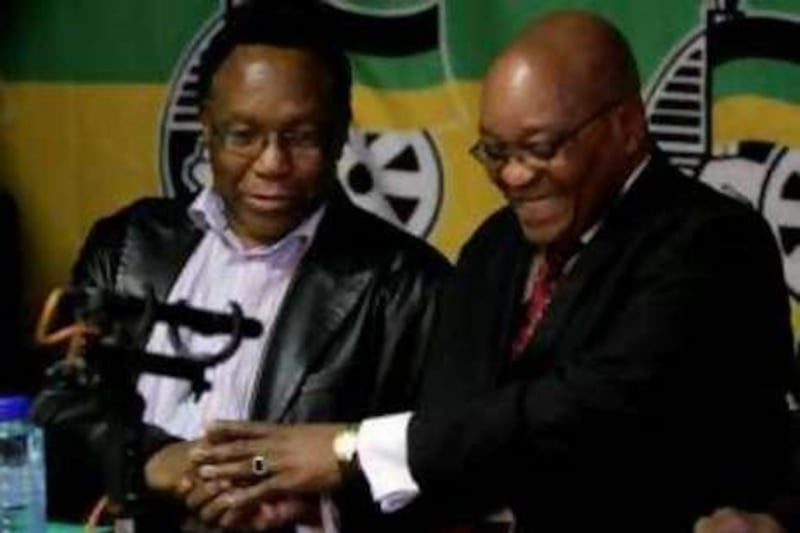JOHANNESBURG // At the end of Thabo Mbeki's speech to the ANC congress last year, a pondering, seemingly interminable discourse that went on for more than 2½ hours, Kgalema Motlanthe walked up to the podium and raised his fist. At the time, Mr Motlanthe was the ANC secretary general, having been elected to the post as an ally of Mr Mbeki five years previously.
"Viva the ANC! Viva!" he cried, to be met with cheers and applause. "Viva comrade President Thabo Mbeki! Viva!" he pronounced, triggering scattered shouts and subdued, polite approval. "Viva comrade Deputy President Jacob Zuma! Viva!" he offered, and the hall erupted into chanting, singing and whistling for the man who was challenging Mr Mbeki for the party leadership. It was a simple and brutally effective political execution. From that moment on, no one could have any doubt about the result of the party election due a few days later.
Now Mr Zuma has overseen the ousting of Mr Mbeki as the national president, in a first for South Africa and an assertion of the party's dominance over the government. But it is Mr Motlanthe, elected as the African National Congress's deputy leader at the same time in Polokwane, who parliament will vote in as president today. With the cloud of corruption allegations still hanging over Mr Zuma, despite the dismissal of formal charges by a judge who implied Mr Mbeki had interfered in the prosecution, and the ANC keen to see its leader enter the Union Buildings with a popular mandate, Mr Motlanthe is being installed as a stop gap measure ahead of elections next year.
South Africa's new president is being put into the position largely because he is a party loyalist. Mr Motlanthe, 59, was born in Alexandra, a township in northern Johannesburg, and as a schoolboy was attracted to Steve Biko's Black Consciousness Movement. He has impeccable struggle credentials, a prerequisite to advancement in the ANC. In his 20s, while he was working for Johannesburg City Council, he joined Umkhonto we Sizwe, the organisation's armed wing. At first his unit concentrated on finding more recruits for military training, but then switched to sabotage activities and smuggling cadres into and out of Swaziland.
In April 1976, two months before the eruption of the Soweto Uprising, he was arrested for furthering the aims of the ANC, which was then banned as a terrorist organisation. He was held in custody before his trial the next year, when he was convicted and sentenced to 10 years in prison, finding himself jailed on Robben Island alongside Nelson Mandela and Walter Sisulu. When he was released he joined the national union of mineworkers, beginning his ascent through the ranks as a strike organiser, and rising to become secretary general in 1992. Five years later he moved across to take the same post in the ANC - his predecessor in both cases being Cyril Ramaphosa, a highly respected figure who is now a billionaire businessman.
A jazz lover and football fanatic - as an aside in Polokwane, he said he would rather coach Bafana Bafana, South Africa's abysmally underperforming football team, than be president - he has successfully maintained his privacy. (His biography page on the ANC website shows only a photograph and a collection of speeches this year). Seen as a Left-leaning intellectual, his trade union background holds him in good stead among Mr Zuma's more radical allies, and his elder status - he is known as Mkhulu, or grandfather in Zulu - is allied to a non-confrontational, soft-spoken, conciliatory and even dull style. He portrays himself as a servant of the party, hence his role in Polokwane, but he is also a figure who is prepared to defend what he sees as the organisation's moral standing.
Eight years ago, he was one of the first people to condemn the beginnings of graft. "We believe South Africa will never be able to overcome corruption unless the ANC itself is incorruptible." And this year he criticised Julius Malema, leader of the ANC Youth League, as "irresponsible" for declaring that he was prepared to "kill for Zuma". It was a rare voice of reason in the fighting that has engulfed the party in the struggle between Mr Mbeki and Mr Zuma, and Mr Motlanthe was once touted as a possible compromise candidate between the two - despite his standing in the Zuma group, he was also on Mr Mbeki's slate of candidates in Polokwane.
But Mr Motlanthe has not been entirely able to avoid scandal. He was alleged to have been involved when claims were made that the ANC benefitted from the oil-for-food scandal in Saddam Hussein's Iraq, and he has connections to Pamodzi, a company that became embroiled in controversy when it emerged that the state-owned Land Bank, set up to help farmers, had loaned it more than US$100 million (Dh367m). The firm denies any wrongdoing.
Nonetheless Helen Zille, leader of the opposition Democratic Alliance, described his nomination for the presidency as "the best case scenario under the circumstances". "Motlanthe is perhaps the most reasonable of all the politicians in the Zuma camp," she said. But she added: "The challenge for Minister Motlanthe is to rise above the ruling party's internal power play and govern in the best interests of the people of South Africa between now and the next election."
She is right. But Mr Motlanthe is one of the best-placed people in the ANC to try to heal the party's self- inflicted wounds. sberger@thenational.ae





